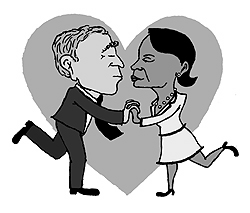As the inevitable Cabinet shuffle unfolds for the second term, one unifying characteristic seems to be an unwavering loyalty to George W. Bush. Call it the Cult of George. It’s nice to like your boss, but it seems a bit unseemly as a primary qualification for being the most powerful person in the country in your given field.
But there it is. It’s not just that these folks all worked for Bush in his first term. Of Bush’s five new appointees announced so far, three are from Texas and worked with Bush when he was governor and then when he became president. A fourth served on Bush’s 2000 campaign and is a longtime protégé of Vice President Dick Cheney. And the fifth is Condoleezza Rice, renowned for having become perhaps the closest confidante of the president in his first term.
Rice is in line to become secretary of state, replacing the outgoing Colin Powell, one of the few voices of relative sanity during the first Bush term. Such moderation won’t be allowed in Act II, and Rice is considerably more of a hard-liner than Powell. It will be interesting to see if the demands of the State Department, with its emphasis on the gray areas of diplomacy, will soften the black-and-white Pentagon/neocon world of Rice, as it did Powell. Powell often found himself on the losing end of internal battles during Bush’s first term. The appointment of Rice tells us that dissenting views aren’t tolerated, and what little regard for diplomacy existed in Bush’s first term is likely to further take a back seat to unilateralism and reliance on force. The loss of a moderating voice is compounded by the departure of Powell’s top aide, Richard Armitage, an experienced diplomatic hand credited with, among other things, helping keep a lid on Indo-Pakistani tension when it threatened to escalate into nuclear war. Armitage and Powell will be missed.
Meanwhile, the Bush Cult worldview continues unabated in the position of national security adviser, where Rice is to be replaced by Stephen Hadley, the Cheney protégé. You might remember Hadley from his first-term exploits as a senior security council adviser. In particular, it was Hadley who took the fall for the inclusion in President Bush’s 2003 State of the Union address of long-discredited allegations that Saddam Hussein’s government tried to purchase weapons-grade uranium from Africa. The allegations turned out to be based on forged documents.
Also thrust into the first-term spotlight for the wrong reasons was Alberto Gonzales, the Texan who has been nominated to replace John Ashcroft as attorney general. While Gonzales is not as confrontational or as zealous a neocon as Ashcroft, he’s at least as dangerous as the nation’s top law-enforcement official. It was Gonzales who, as White House chief counsel, wrote the memo justifying the use of torture on war-on-terror prisoners in Afghanistan, Guantánamo Bay, and, eventually, Iraq, dismissing provisions of the internationally revered Geneva Conventions as “quaint.” Given that Ashcroft was best known for the Patriot Act and the detaining of thousands of Muslim citizens and noncitizens in the wake of 9/11, one can only imagine what a Gonzales Justice Department would do in the event of another terror attack. Or even without one.
Yet another Texan, Harriet Miers, is replacing Gonzales as White House counsel. A Dallas lawyer, she served as deputy chief of staff in Bush’s first term. Another senior Bush adviser, Margaret Spellings, is replacing Rod Paige as secretary of education. In the first term, Spellings, a former education lobbyist from Houston, was a domestic policy adviser who played a key role in shaping the No Child Left Behind Act. Bush has said that a domestic priority in his second term is to expand the act to include mandatory testing in high schools.
At least two other vacancies will be filled in Bush’s second term: secretary of agriculture, to replace the departing Ann Veneman, and secretary of energy, where Spencer Abraham was unable to push through drilling in Alaska or other aspects of the administration’s lobbyist-driven energy policy.
Abraham and Ashcroft—former senators who had not worked with Bush before his first term—are exactly the sort of outside hires Bush has yet to make in his second term. Instead, so far, he’s relying on people whom he has learned, in his first term and as Texas governor, he can trust. By and large, that means they’ve been loyal.
It also means, in essence, that the neocons have won. There will be no stray liberal or moderate voices polluting Bush’s second term, no questioning of the boss, no attempts to win, as Bush has promised, the trust of those who voted for John Kerry. It’s likely to be a long four years.







